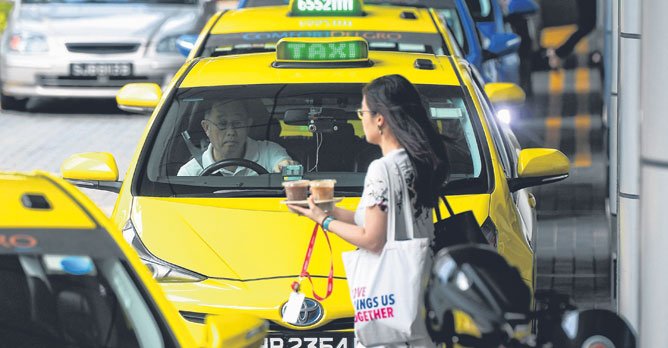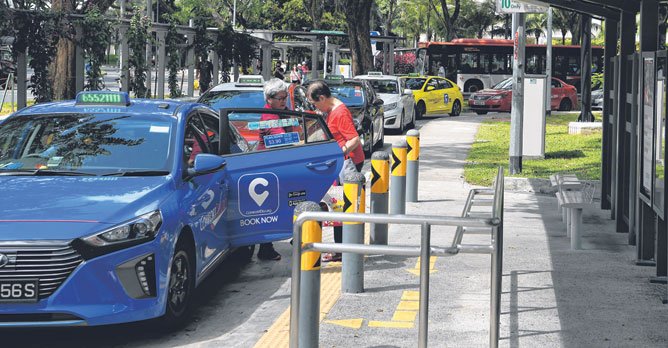LTA urges taxi passengers to scan SafeEntry QR code
12 May 2020|414 views
Commuters are being urged to scan the SafeEntry QR code that will be appearing in taxis from today to help facilitate contact tracing in case they are at risk of having been infected with COVID-19.
A Land Transport Authority (LTA) spokesman said that street-hail passengers "are strongly encouraged to be socially responsible and scan the SafeEntry QR codes at the point of boarding".

SafeEntry - a digital check-in system - helps tracers find close contacts of infected cases quickly. The system logs the names, NRIC/FIN numbers and mobile phone numbers of individuals visiting hot spots, workplaces of essential services and selected public venues.
People who book rides via taxi apps or ride-hailing platforms need not scan the QR code as there is already other data available to help in contact tracing if needed.
Transcab General Manager Jasmine Tan said the taxi firm - the third-largest player here - will work with the authorities to roll out SafeEntry progressively on all its vehicles. ComfortDelGro declined to comment, while SMRT had not responded as of press time. Taxi drivers could refuse to accept the trip if passengers do not scan the code, according to the Government's GoBusiness site.
The SafeEntry QR code replaces an earlier QR code in taxis also meant for contact tracing purposes. Some cabbies and commuters told The Straits Times that while the concept is sound, challenges like getting people to scan the code remain.
"The first thing that comes to mind is to navigate to the location and not (to ask passengers to) scan the QR code," said Transcab Cabby Mr. Toh, 67, who declined to give his full name. Of course, we can remind them, but it is still up to the passenger to do it themselves. We can't enforce."
There were also concerns that some elderly passengers who might not be tech-savvy could have problems operating their smartphones to scan the QR code, said ComfortDelGro Cabby Salim Hashim. "Some of them still own normal phones, not a smartphone," he added.
Commuter L.Y. Tan, 30, who works in the hospitality industry, said, "Sometimes the driver is busy, with his eyes on the road, and he might not have time to coach the passenger on scanning the QR code."
LTA data shows that Singapore had 17,977 taxis in March, down from the 18,528 in January and a 10% fall from a year earlier.
Commuters are being urged to scan the SafeEntry QR code that will be appearing in taxis from today to help facilitate contact tracing in case they are at risk of having been infected with COVID-19.
A Land Transport Authority (LTA) spokesman said that street-hail passengers "are strongly encouraged to be socially responsible and scan the SafeEntry QR codes at the point of boarding".

SafeEntry - a digital check-in system - helps tracers find close contacts of infected cases quickly. The system logs the names, NRIC/FIN numbers and mobile phone numbers of individuals visiting hot spots, workplaces of essential services and selected public venues.
People who book rides via taxi apps or ride-hailing platforms need not scan the QR code as there is already other data available to help in contact tracing if needed.
Transcab General Manager Jasmine Tan said the taxi firm - the third-largest player here - will work with the authorities to roll out SafeEntry progressively on all its vehicles. ComfortDelGro declined to comment, while SMRT had not responded as of press time. Taxi drivers could refuse to accept the trip if passengers do not scan the code, according to the Government's GoBusiness site.
The SafeEntry QR code replaces an earlier QR code in taxis also meant for contact tracing purposes. Some cabbies and commuters told The Straits Times that while the concept is sound, challenges like getting people to scan the code remain.
"The first thing that comes to mind is to navigate to the location and not (to ask passengers to) scan the QR code," said Transcab Cabby Mr. Toh, 67, who declined to give his full name. Of course, we can remind them, but it is still up to the passenger to do it themselves. We can't enforce."
There were also concerns that some elderly passengers who might not be tech-savvy could have problems operating their smartphones to scan the QR code, said ComfortDelGro Cabby Salim Hashim. "Some of them still own normal phones, not a smartphone," he added.
Commuter L.Y. Tan, 30, who works in the hospitality industry, said, "Sometimes the driver is busy, with his eyes on the road, and he might not have time to coach the passenger on scanning the QR code."
LTA data shows that Singapore had 17,977 taxis in March, down from the 18,528 in January and a 10% fall from a year earlier.
Latest COE Prices
September 2025 | 1st BIDDING
NEXT TENDER: 17 Sep 2025
CAT A$107,889
CAT B$127,501
CAT C$71,556
CAT E$127,901
View Full Results Thank You For Your Subscription.




















